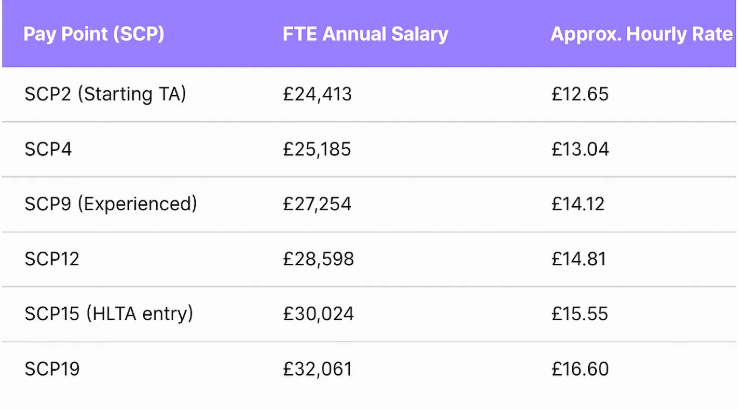No products in the cart.
Curious about what is teaching assistant salary in the UK for 2025/26? Here’s a quick overview. Most TAs follow the NJC pay scale, which rises yearly, with a 3.2% increase this April. Also, full-time salaries range from £24,796 to £32,061, depending on your level and experience.
However, most TAs work only during school terms, so they usually earn about £17,000 to £19,000 a year. It’s all about the hours and weeks worked. Want to know how your pay is really calculated and what affects your take-home? Let’s keep reading — we’ll make it clear, simple, and easy to understand!
In this guide, we’ll cover:
- Payroll system – how your pay is calculated
- Senior/SEN roles – higher pay rates
- Pay factors – location, experience, duties, contract type
- Career tips – ways to boost salary
- Benefits – SEN allowance, pension, pro-rata term-time pay
What Is Teaching Assistant Salary?
So, what is teaching assistant salary in the UK really about? In simple words, it’s the pay you get for helping teachers and supporting students every day in class. Most schools use the National Joint Council (NJC) pay scale, which decides how much TAs earn. A full-time teaching assistant can earn between £24,796 and £32,061, depending on experience and level.
But here’s the thing, most TAs don’t work all year round. They work during school terms only, so their pay is pro-rata based on the weeks and hours they actually work. For example, if a job shows £25,000 full-time, your real pay might be around £17,000 to £19,000.
That’s why the big NJC number in job ads isn’t what ends up in your bank. Once you add in tax, National Insurance, and pension deductions, the take-home pay is smaller. Still, it’s steady and meaningful work. Additionally, with teaching assistant pay explained, you can understand your earnings better, plan wisely, and feel confident in your role.
How Much Do Teaching Assistants Earn Per Hour?
So, how much do teaching assistants earn per hour in the UK? On average, classroom TAs earn around £12 to £16 an hour, depending on their experience and pay scale. The starting rate (SCP2) is roughly £12.65 per hour, while senior or higher-level assistants can earn over £20 per hour.
It’s important to remember that teaching assistant hourly pay UK is usually based on term-time work. This means your total yearly income depends on how many hours and weeks you work, not just your hourly rate.
Why Teaching Assistant Salary Varies Across the UK

There are some key reasons why teaching assistant pay isn’t the same everywhere.
- Local authority differences
Pay varies by local council. Some areas pay more, while others pay less. Because of this, TA salaries can look different across the country. - London weighting & fringe allowances
TAs in London or nearby get extra pay to cover higher living costs. This bonus is known as ‘London weighting’ or a ‘fringe allowance’. It helps make pay fairer between regions. - Contract type
TAs usually work term time and earn pay only for those weeks. However, full-year contracts include holidays, so the total pay is higher. - Experience & extra duties
Pay rises with experience, training, and extra duties. For example, TAs who support SEN pupils or give one-to-one help often earn more. In addition, schools may increase pay when TAs take on more responsibility.
Teaching Assistant Pay Scales UK (With NJC Uplift)
Many people ask how the TA salary UK scale works. Most teaching assistant pay is set by the NJC pay band system used by local councils. This is called the NJC pay scale UK 2025 (National Joint Council).
- In 2024, every point on the scale went up by £1,290.
- From April 2025, pay increased by 3.2% across all pay points.
- Salaries are shown as FTE (full‑time equivalent).
- Most TAs work term‑time only, so pay is pro‑rata (lower take‑home).
- In London and nearby areas, there is extra weighting pay.
TA Salary Bands
Here are the most common teaching assistant pay bands after the April 2025 rise:

Remember: These are FTE salaries. If you work term‑time (most TAs do), your actual pay is lower because it’s pro‑rata.
Term-Time Teaching Assistant Salary Explained
If you’re curious about teaching assistant term-time pay, here’s the simple truth. Most TAs don’t work all year; they work 38 to 39 school weeks, not the full 52 weeks.
That’s where pro-rata TA salary comes in. Your pay is calculated based on the FTE (full-time equivalent) salary, but adjusted for the weeks and hours you actually work.
For example, an SCP2 TA with a £24,413 FTE salary will usually take home around £18,000 per year on a term-time contract. So, understanding this makes it easier to plan your budget and see what your TA annual salary in the UK really is.
What Is a Teaching Assistant?
A teaching assistant (TA) is someone who helps teachers and students every day. They make sure lessons run smoothly and everyone gets the help they need. Also, TAs help make the classroom a safe, friendly, and fun place to learn. They might also assist during school trips, lunchtime, or after-school clubs, so they’re a big part of school life.
What does a teaching assistant do?
Normally, teaching assistants help students in small groups or one-on-one, get lessons ready, and keep the class calm and focused. They also listen to students read, explain difficult work, and encourage good behaviour. Because they work closely with teachers, TAs make learning easier and more enjoyable for everyone.
Teaching assistant requirements
Most schools expect TAs to have GCSEs in English and Maths. They also need a DBS check (Disclosure and Barring Service) to show they can work safely with children. Besides, TAs complete safeguarding training, like the Level 1 Safeguarding Children Certificate, to help keep pupils safe. Some schools also prefer TAs with a Level 2 or Level 3 Teaching Assistant qualification. Moreover, kindness, patience, and teamwork help TAs build positive, caring classrooms. Over time, they can learn new skills, take extra courses, and move into higher roles within the school.
If you’re ready to take the next step, check out the Requirements to Be a Teaching Assistant guide by Open Learning Academy. It clearly explains what qualifications you need, how to get certified, and how to start your career in education the right way — whether you’re just beginning or looking to grow into a higher-level school role.
Teaching Assistant Roles in the UK
There are several teaching assistant roles across schools in the UK, each with different duties and pay.
- General classroom TA: Supports the teacher and helps all pupils in class.
- SEN TA / 1:1 support: Works with children with special educational needs. These roles often earn more, reflecting extra responsibility (SEN TA salary UK).
- EYFS TA: Works with younger children in the Early Years Foundation Stage, helping with learning and play.
- Intervention/specialist support: Provides focused help in areas like reading, maths, or behaviour.
Understanding the types of TA can help you choose the right role for your skills and experience. And if you’re interested in roles beyond the classroom, like supporting children in nurseries, don’t miss our guide: Can a Teaching Assistant Work in a Nursery?.
What Is a Higher Level Teaching Assistant (HLTA)?
A Higher Level Teaching Assistant (HLTA) is an experienced, skilled support staff member in UK schools. They take on more responsibility than a standard TA and play a key role in helping pupils learn and keeping classrooms running smoothly.
HLTA Role and Duties
- Leading Classes & Covering Lessons: HLTAs can lead a whole class for planned learning or cover a teacher’s short absence.
- Planning & Delivering: They help plan and deliver lessons for individuals, small groups, or whole classes under a teacher’s guidance.
- Assessment & Reporting: HLTAs record and report on pupil progress and attainment.
- Specialist Support: They often focus on areas like literacy, numeracy, or SEN.
- Staff & Parent Liaison: Some manage classroom staff and communicate with parents on sensitive matters.
HLTA Salary (UK FTE)
- Typical full-time salaries range from £27,000 to £33,000 per year.
- Remember, most HLTAs work term-time only and may be part-time, so pro-rata pay means the take-home is often lower.
- Pay varies with local authority, region (e.g., London weighting), experience, and role responsibilities.
HLTA Requirements
- Already an experienced TA.
- Meet the 33 HLTA Professional Standards.
- Have Level 2 qualifications in English/Literacy and Maths/Numeracy (or pass access tests).
- To get HLTA status, you are assessed by a regional provider. First, submit a portfolio and do written tasks, then take part in an assessment with discussions.
- Usually need headteacher support to apply.
HLTAs are trusted, skilled, and often rewarded with higher pay and responsibility. They’re a step up from standard TAs and a valuable part of any school team.
Can a Teaching Assistant Become a Teacher Without a Degree?
Basically yes! A TA can become a teacher even without a degree. You just need to earn Qualified Teacher Status (QTS), which lets you teach in state schools.
Main Routes for Non-Graduates
- Teacher Degree Apprenticeship (TDA): Work in a school, earn a salary, study for a degree, and get QTS. Requires GCSEs in English & Maths (Science for primary) and A-levels or equivalent.
- Undergraduate ITT: University-led course (BEd, BA, BSc) with QTS included. Full-time study for 3–4 years.
Why TA Experience Helps
- You already know about classrooms and pupil support.
- Shows dedication and commitment.
- Gives a head start on teacher standards.
If you already have a degree, salaried routes like Postgraduate Teaching Apprenticeship or School Direct are also options.
Teaching Assistant Allowance and Benefits in the UK

Teaching Assistants (TAs) in UK schools get several helpful benefits and allowances as part of their “Green Book” contract.
- Pension Contributions (LGPS) – Most TAs join the Local Government Pension Scheme. You pay 5.5%–12.5% of your salary, while your school contributes the majority. Plus, contributions get tax relief.
- Paid Leave (Pro-Rata) – Since most TAs work term-time only, their pay is pro-rated for the weeks and hours worked. This also covers statutory leave and bank holidays. Salaries are usually paid in 12 monthly instalments for stability.
- SEN Allowance TA – TAs supporting SEN pupils or working 1:1 often get extra pay. Some schools offer a flat SEN allowance (e.g., ~£1,500 FTE), while others place the role on a higher pay point.
- Pay Award Timeline – TAs follow the NJC Green Book pay scale. Increases take effect from 1 April but may appear on payslips months later. Any backdated pay covers the period from April onwards.
How to Grow Your Teaching Assistant Salary in 2025
Searching for how to increase teaching assistant salary? The April 2025 pay rise gives all TAs a 3.2% boost, but you can earn more by taking action.
Start by gaining extra skills. Complete HLTA training to lead classes and cover lessons. Specialising in SEN support or safeguarding can also move you to a higher pay band.
Next, take on extra responsibilities. Run after-school or breakfast clubs. Help with lunchtime supervision. Work as a cover supervisor. These roles add extra pay and experience.
Location matters too. Schools in London and the surrounding areas pay more because of London Weighting allowances. Most TAs work term-time only, so pay is pro-rata. For example, an SCP2 TA may earn £17,000–£19,000, where regular full-time FTE pay is around £24,400.
Teaching Assistant Career Paths
If you’re a Teaching Assistant (TA), there’s a clear path to improve your career and your pay. Most TAs start in the classroom and can move up to Senior TA, HLTA, and even become a fully qualified teacher (QTS) if they want.
1. Teaching Assistant (TA)
As a TA, you support the teacher every day. You help small groups, work with individual pupils, and keep the classroom running smoothly. Most TAs need Level 2 or 3 qualifications in Supporting Teaching and Learning. In 2025, the starting salary is about £24,413 FTE, but term-time contracts usually mean your take-home pay is around £18,000.
2. Senior TA
Next, you can become a senior TA. Here, you take on more responsibility. You might mentor junior TAs, manage resources, or lead a year group. Pay rises too; around £25,000 FTE, more if you specialise in SEN.
3. Higher Level Teaching Assistant (HLTA)
HLTAs have a bigger role in the classroom. You can cover lessons, plan and deliver learning activities, and assess pupil progress. To become an HLTA, you need Level 4 HLTA qualifications and must meet professional standards. Salaries range from £23,000 to £30,000+ FTE, depending on your responsibilities and location.
Path to Qualified Teacher Status (QTS)
If teaching is your goal, there are routes to gain QTS:
- PGCE/SCITT: Requires a degree and GCSEs. Combines study with placements.
- School Direct (Salaried): Work while training and earning a salary.
- Assessment Only: If you have experience, you can get QTS without full training.
- Teacher Degree Apprenticeship: Work in a school while earning a degree and QTS.
Starting QTS salaries are higher, around £32,916, excluding London.
Specialist Support Roles
Not everyone wants to teach, and that’s okay! You can specialise and earn more in support roles:
- SEN: Help pupils with learning or behavioural needs (e.g., SEN Practitioner).
- Behaviour: Manage challenging behaviour or lead support strategies.
- Pastoral: Focus on welfare, emotional well-being, and safeguarding.
With the right skills, experience, and qualifications, you can grow your TA career in the UK while making a real difference for students every day.
FAQs
- What is a teaching assistant’s salary?
- TA salaries in 2025 range from £24k to £27.5k FTE, while HLTAs earn £29k to £33k FTE.
- Do teaching assistants get paid in school holidays?
- Most TAs work term-time only, so pay is pro-rata, though some schools spread it over 12 months.
- Are TAs salaried or hourly?
- TAs are usually salaried, with hourly pay for cover or supply roles ranging £12–£16, and senior roles over £20/hr.
- How much extra for SEN roles?
- SEN duties often include an allowance, sometimes around £1,500 FTE, depending on the school or council.
- Can TAs negotiate pay?
- Yes, TA pay negotiation UK works if you highlight experience, qualifications, or extra responsibilities.
Final Thoughts
In conclusion, let’s consider that 2025 is a promising year for teaching assistants. The 3.2% pay rise sounds good, but remember, your actual take-home depends on term-time work, role, and location. To earn more, TAs can gain qualifications, take on extra duties, or move into HLTA or teacher training. Checking local NJC pay scales carefully helps you plan your next move.
Want to increase your TA pay? Enhance your skills with the Teaching assistant course at Open Learning Academy; start your journey now!




